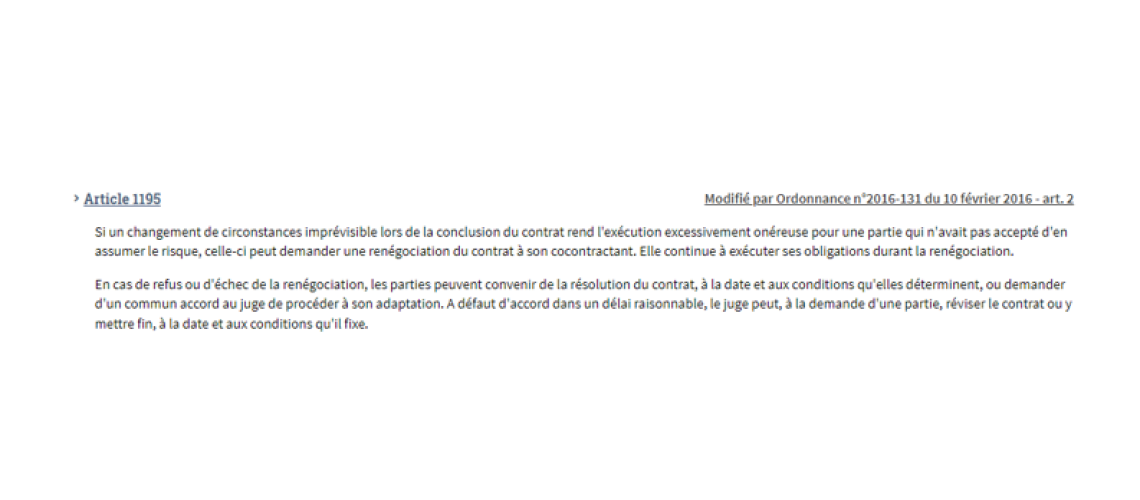Introduction
By a very rare, if not unique, decision rendered on 14 December 2022,(1) a French commercial court terminated a contract at the request of one of the parties by applying the hardship rule of article 1195 of the French Civil Code.
Although article 1195 is often invoked in French courts, courts have proved very reluctant to make use of the hardship provision, which grants judges extraordinary powers to amend existing contracts. This decision is particularly important for aircraft lessors and the types of aircraft lease and long-term maintenance agreements they sign up to.
Background
Until 2016, parties to a contract had limited options to obtain a release from their contractual obligations, even in cases where unforeseen events adversely and materially altered the economic circumstances under which the contract was initially formed. They typically had to obtain the consent of the other party or demonstrate the occurrence of a force majeure event preventing them from fulfilling their obligations.
However, by an ordinance dated 10 February 2016, the French parliament introduced a new article to the French Civil Code, article 1195, offering an alternative solution to parties facing unforeseeable changes of circumstances since the contract’s inception. These changes would render the performance of their contractual obligations excessively onerous, which is when article 1195 would apply.
According to the wording of law, provided that the affected party has not agreed to bear the financial risk of a change of circumstances, article 1195 allows the latter to ask the other party to renegotiate the contract. If such renegotiation is refused or unsuccessful, the parties can agree to terminate the contract or request the court to adapt the contract by mutual agreement. Ultimately, if no agreement is reached within a reasonable time, the affected contracting party can ask the court to revise certain provisions of the contract or to terminate it on the date and under the conditions that the court will determine.
Facts
In the case at hand, a French supplier of ceramic tiles signed a contract with a French property developer to sell tiles to customers under certain terms and conditions provided in the contract. Due to the covid-19 pandemic and the war in Ukraine, prices of raw materials, energy and transport raised dramatically, making it very difficult, if not impossible, for the supplier to provide the property developer with ceramic tiles at the initially agreed price.
After failed renegotiation attempts, the supplier sued the property developer in the Paris commercial court to seek revision of the contract by the judge on the basis of article 1195 of the French Civil Code.
The court did not order the revision of the contract (on the grounds that the supplier provided insufficient evidence of the prices increase). However, it did uphold the supplier’s alternative request to terminate the contract. It can be assumed that if the supplier had provided sufficient evidence of the prices increase, the court would have amended the agreement.
Comment
Interestingly, the rule contained in article 1195 is inconsistent with the traditional French civil law rule that the contract is the rule of the parties (and may thus not be amended by the court other than in strictly limited circumstances). Article 1195 was inspired by a long-standing principle of French public law whereunder a private contractor may request the court to amend a contract with the authority if the economic balance of the contract has become materially adverse to the private contractor over the term of the contract.
Though the case at hand related to the supply of tiles, the court’s decision could easily be applied to an aircraft lease or a long-term maintenance agreement. An airline or an aircraft operator could argue that, due to adverse economic circumstances (eg, a pandemic, a war, a natural disaster or difficulties in the supply of spare parts or material) the financial burden of the contract has become unbearable.
Since its introduction in 2016, article 1195 has been often invoked in French courts. However, they have been reluctant to amend or terminate an agreement on the grounds of hardship. This is probably due to the fact that, as outlined above, hardship (as ruled by article 1195) does not belong to the French civil law tradition.
Furthermore, not all conditions were met for article 1195 to apply in the cases presented to French courts. One of these conditions is that the affected party must not have agreed in the contract to bear the financial risk of a change of circumstances. In that respect, aircraft leases often contain stringent provisions shifting all risks to the lessee, which would probably – even in contracts governed by French law – make it difficult for the lessee to make a case under article 1195.
Nonetheless, the French legal practice has developed a straightforward « no hardship » provision, and this waiver of the provisions of article 1195 has been successfully tested in several recent court of appeal decisions. Aircraft lessors will be better off including such waivers in their French law leases to avoid any unnecessary legal debate.
Endnotes
(1) Commercial court of Paris, 14 December 2022, No. 2022033136.



